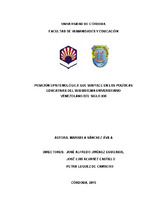Mostrar el registro sencillo del ítem
Posición epistemológica que subyace en las políticas educativas del subsistema universitario venezolano
| dc.contributor.advisor | Jiménez Eguizábal, José Alfredo | |
| dc.contributor.advisor | Álvarez Castillo, José Luis | |
| dc.contributor.advisor | Luquez Camacho, Petra | |
| dc.contributor.author | Sánchez Ávila, Marisela del Carmen | |
| dc.date.accessioned | 2016-02-25T11:14:35Z | |
| dc.date.available | 2016-02-25T11:14:35Z | |
| dc.date.issued | 2016 | |
| dc.identifier.uri | http://hdl.handle.net/10396/13278 | |
| dc.description.abstract | El objetivo de esta investigación es analizar la posición epistemológica que subyace en las políticas educativas del subsistema universitario venezolano desde 2000 al 2013. Metodológicamente este estudio siguió orientaciones documentales-descriptivas y un diseño de campo. Teóricamente se sustentó en los aportes de Toulmin (1977), Vigotski (1987), Argyris y Schön (1989), Tello (2013), Padrón (1998), Habermas (1990), Jiménez, Jiménez y Palmeiro (2006) y otros. Las técnicas de investigación utilizadas fueron la revisión documental y la encuesta. En la primera se emplearon como instrumentos una guía de observación documental y una matriz descriptiva; en la segunda se aplicó un cuestionario, conformado por 24 preguntas, dirigidas a 50 estudiantes, pertenecientes a 03 aldeas universitarias de la Misión Sucre del Municipio Maracaibo del Estado Zulia. La técnica aplicada en el análisis de los datos es la estadística descriptiva, para reflejar frecuencias y porcentajes. Finalmente se concluye que la posición epistemológica que prevalece con mayor preferencia en la Misión Sucre es el enfoque instrospectivo vivencial de acuerdo al 89% de los estudiantes, continua el racional con el 74% y luego el empírico con 58%; sin embargo la primera posición no es única, pues estos resultados reflejan también la presencia de los otros enfoques que dominaron tradicionalmente la filosofía de la ciencia y aún se evidencian en esta realidad investigada. | es_ES |
| dc.description.abstract | The objective of this research is to analyze the epistemological position underlying the educational policies of the Venezuelan university subsystem from 2000 to 2013. Methodologically this documentary-descriptive study followed guidelines and design field. Theoretically it was based on input from Toulmin (1977), Vygotsky (1987), Argyris and Schon (1989), Taylor (2013), Padron (1998), Habermas (1990), Jimenez Jimenez and Palmeiro (2006) and others. The research techniques used were document review and survey. The first instruments were used as a guide for documentary and descriptive observation matrix; in the second questionnaire, consisting of 24 questions aimed at 50 students, 03 university villages belonging to the municipality of Sucre Mission of Maracaibo, Zulia State was applied. The technique applied in the analysis of data is descriptive statistics to reflect frequencies and percentages. Finally we conclude that the epistemological position that prevails more preferably in the Sucre Mission is introspective experiential approach according to 89% of students, continuous rational to 74% and then 58% empirical; however, the first position is not unique, since these results also reflect the presence of the other approaches that have traditionally dominated the philosophy of science and is still evident in this situation investigated. | es_ES |
| dc.format.mimetype | application/pdf | es_ES |
| dc.language.iso | spa | es_ES |
| dc.publisher | Universidad de Córdoba, UCOPress | es_ES |
| dc.rights | https://creativecommons.org/licenses/by-nc-nd/4.0/ | es_ES |
| dc.subject | Política educativa universitaria | es_ES |
| dc.subject | Enfoques epistemológicos | es_ES |
| dc.subject | Misión Sucre | es_ES |
| dc.subject | University Education Policy | es_ES |
| dc.subject | Epistemological approaches | es_ES |
| dc.subject | Mission Sucre | es_ES |
| dc.title | Posición epistemológica que subyace en las políticas educativas del subsistema universitario venezolano | es_ES |
| dc.type | info:eu-repo/semantics/doctoralThesis | es_ES |
| dc.rights.accessRights | info:eu-repo/semantics/openAccess | es_ES |

